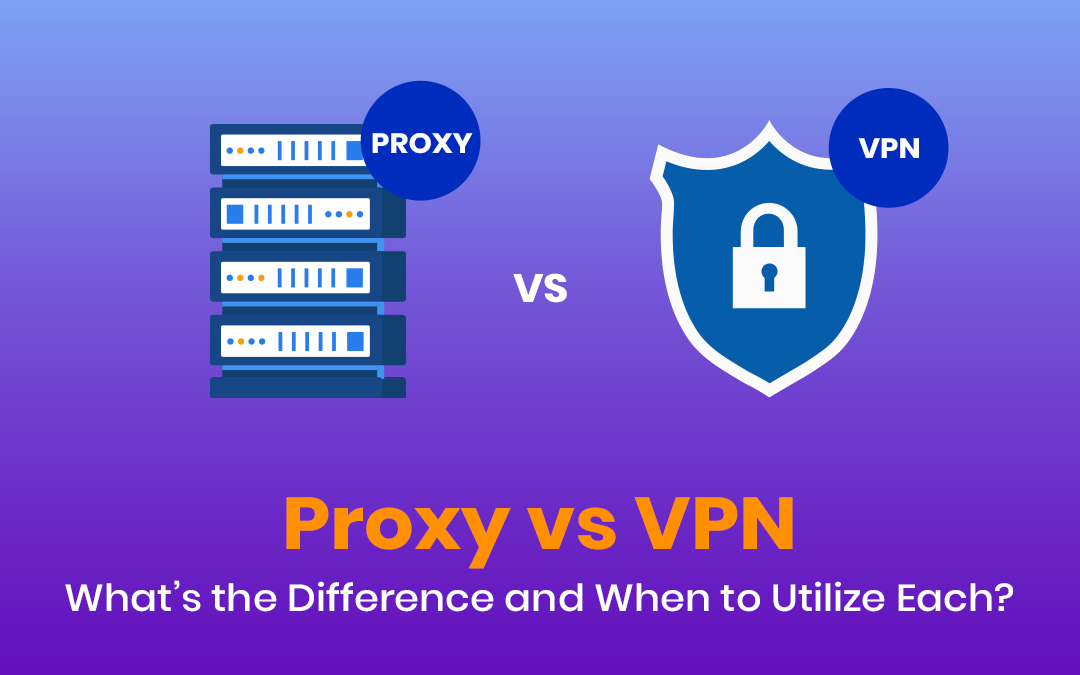
The issue of digital privacy and security has become a significant worry for the 4.9 billion individuals worldwide who rely on the Internet for both professional and recreational purposes.
Due to a rise in cyberattacks (a 38% increase in 2022), incidents of identity theft (with the US Federal Trade Commission reporting 5.7 million cases in 2021 alone), and various malicious activities, individuals are actively exploring methods to make their online activities anonymous and protect their data from these malicious activities.
Two commonly used technological solutions aiding individuals in achieving this objective are virtual private networks, commonly referred to as VPNs, and proxy servers.
However, what sets them apart, and when should you employ each?
Proxy vs VPN – Where Does the Line Fall?
Proxy Servers: A Comprehensive Overview
Proxy servers act as intermediaries between your internet-enabled devices and online services. Before your data reaches its intended destination, it passes through these servers. Consequently, the hosting company can't detect your IP address, as the proxy server takes its place.
Proxies can serve as firewalls and web filters. It safeguards your devices from hacks. Furthermore, they can enhance your browsing experience through the compression of traffic and the caching of files.
There are multiple proxy options exist to anonymize your online activities:
- Forward proxies enable data exchange among user groups and evaluate requests before establishing connections.
- Public proxies provide you with an alternative IP address but lack protective mechanisms.
- Anonymous and high-anonymity proxies go the extra mile to conceal your activities, like erasing your data before establishing connections with websites.
- Secure socket layer (SSL) proxies, in addition to providing an alternative IP address, make the network traffic indecipherable to third parties.
While our list may not cover every aspect, it aims to provide a broad overview of proxies – thereby adding further complexity to the comparison between VPNs and proxies.
Although multiple proxies use encryption methods like VPNs, the responsibility for this process falls on the proxy server operator. Given that nearly 70% of free proxies are overseen by criminals. We advise against utilizing proxies unless you can verify the credibility of the companies behind them.
Conversely, proxies, particularly those without encryption features – may offer faster speeds than VPNs. This is because they merely redirect your traffic, demanding less computing power.
VPNs: A Comprehensive Overview
A VPN is a service that secures your internet traffic by encrypting it and routing it through distant servers. Consequently, the website/service you visit remains unaware of your location.
Essentially, this is the basic premise of how proxies operate. However, VPNs offer additional features beyond just masking your location.
First and foremost, VPNs employ sophisticated encryption technologies to protect your data. It prevents interception or manipulation, especially when connecting to unsecured Wi-Fi networks. As a result, the cybersecurity provided by VPNs is significantly more robust than proxies.
Furthermore, as a VPN routes your internet traffic, it proves versatile for various internet activities like streaming video content, gaming, and web browsing. Conversely, proxies are most effective for routine and casual browsing.
When to Utilize a VPN vs. Proxy
Now that you're familiar with the distinctions between these two online communication technologies – let's explore the situations in which it's advisable to employ either a VPN or a proxy.
Proxy Server Use Cases
Proxies come in handy when you prefer not to reveal your IP address and prioritize convenience over security. Such examples include:
- Web scraping: When extracting data from a third-party website, such as for competitor research at your workplace, the website's hosting company won't block your IP address.
- Accessing location-restricted content: If a website may not be available in your region, proxies can grant unrestricted access to it.
- Faster browsing: The proxy store commonly accesses websites in a cache, leading to quicker loading times and enhancing the overall browsing experience.
VPN Use Cases
-
Using public Wi-Fi: You can conduct Zoom meetings while enjoying the ambiance of your preferred coffee shop. However, using unsecured Wi-Fi allows cyber attackers to seek confidential information. Utilizing a trustworthy VPN on Windows, macOS, Android, or iOS devices will encrypt your data.
-
Torrenting: A VPN prevents your internet provider from monitoring your actions when using peer-to-peer (P2P) services for file downloads. Nonetheless, while a virtual private network doesn't offer antivirus features, it won't protect your devices from potential infection if you run a harmful program hidden within your downloads.
-
Using online banking: A VPN shields against data breaches while using banking apps, online shopping platforms, and any software handling sensitive information. Employing end-to-end encryption and masking IP addresses establishes this security.
-
Accessing geo-restricted content: VPNs assist users in bypassing restrictions imposed by their governments or companies on specific websites and streaming services by substituting their real IP address with a server address registered in another country.
-
Browsing ad-ridden websites: Free streaming services and news or entertainment websites rely on banner ads to sustain their businesses. Although Google works with advertisers to identify dangerous websites and ads, adware—malicious software that inundates your screen with undesired advertisements, generating revenue for its creators—currently constitutes 48% of all Internet-based malware. Modern VPNs, like 7VPN, feature integrated adblockers that remove intrusive and potentially harmful advertisements from your browsers, reducing the chance of contracting a computer virus.
VPN vs. Proxy: Which is the Ideal Choice for You
The decision between a VPN or proxy relies on your requirements in the end.
A trustworthy proxy server could be ideal if you aim solely to conceal your IP address and overcome restrictions. Nevertheless, if you worry about the security of your data, opt for a VPN instead.
Share this post
Leave a comment
All comments are moderated. Spammy and bot submitted comments are deleted. Please submit the comments that are helpful to others, and we'll approve your comments. A comment that includes outbound link will only be approved if the content is relevant to the topic, and has some value to our readers.

Comments (0)
No comment